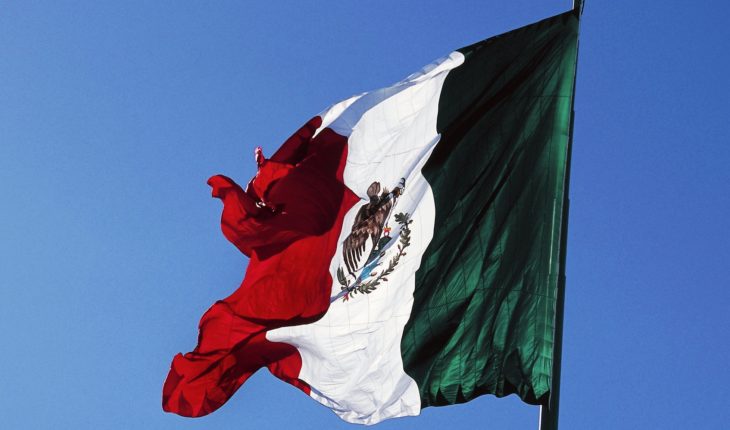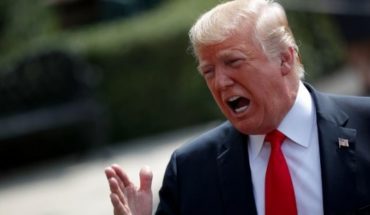while the President of the United States, Donald Trump, remains steadfast in his insistence to build a wall along the border between his country and Mexico, the new Mexican President seeks less than s us fellow citizens feel the need to migrate in the first place.
To achieve this, Andrés Manuel López Obrador has launched a new initiative to boost the economies of the towns and cities along the Mexican side of the border.
The hope is that companies grow and employ more people, increasing prosperity.
But, what are the details of the new ‘free zone’ or free zone scheme, and will work?
It is midday at the Hotel La Villa de Zaragoza, in the center of Tijuana, the Mexican city that lies on the other side of the border with San Diego, California.
Gerardo Santos Gonzales chef and waitress Patricia Olvera Martínez are beginning their well-known routine serve lunch.
The FRY a bit of oregano in a frying pan over a gas flame, while she takes the first orders at the restaurant. Freshly made sauces and corn tortillas are ready to be consumed.
“The new free trade zone should help people here to get a job,” said Gerardo. “It could transform the lives of Mexicans here… and Yes, some will not feel the need to seek work in the United States.”
The free zone scheme was introduced last month when Lopez Obrador announced at the end of last year.
It applies to the entire area of the border between US and Mexico, which has a total length of 3.180 km, and extends over a width of 25 km. There, the sales tax has been reduced to half: from 16% to 8%.
At the same time, income taxes were reduced from 30% to 20% and the minimum wage doubled to 176,20 pesos (US$ 9.24) per day.
In addition, prices of fuel in the area have been reduced to the same level as in the us.
The López Obrador President, hopes that, in addition to reducing emigration to us., the initiative encouraged American companies to invest in Mexican companies and, therefore, to promote cross-border trade links.
“It is a very important project to win investment, create jobs and take advantage of the economic strength of us.,” said the President.
Getty ImagesAMLO – who took over from December 1, 2018 – the plan of the “free zone” designed to strengthen economically to the border region of Mexico.adrian Valdés, a young Tijuana businessman, says he has hopes that the plan really gives a boost to the companies in the border area.
“At this moment we import many finished products and not we are producing according to our potential,” he says.
Valdes, owner of a consulting firm to advise companies on how to reduce their environmental impact, adds that it is vital that you retain more knowledge, talent and production on the Mexican side of the border.
The free zone scheme was implemented shortly once Mexico, EU and Canada signed a new trade agreement last November.
Salary costs Nikia Clarke, of the San Diego Regional Economic Development Corporation, said that the new initiative of the Mexican Government provided “additional clarity on the relationship between EU and Mexico cross-border production”.
However, warns that it is not yet clear “how the increase in the minimum wage will affect the balance sheets of many companies operating south of the border, which could have been installed there for reasons of cost, or if the income tax cut will be moderated (that” extra expense) “.”
Getty ImagesLas companies within the ‘free zone’ will have to double the minimum wage for its workers, but it will have tax advantages. Beyond this, Clarke points out that “economic development in the border region is good for Mexico; “in the long run probably help with some of the challenges of migration and thus also is good for us”.
Among the Mexican business community in general, also is worried about the doubling of the minimum wage within the border area.
Carlos Castañeda directs the House of local commerce, or “Canaco”, in Ciudad Juarez, which lies across the rio Grande from the Texas City of El Paso.
It fears that the wage problem now becomes “a struggle between a company and its employees”.
Other Mexican business leaders have expressed concerns that companies in other parts of the country move to the border, damaging the area they leave behind.
Getty ImagesMuchos believe that it is vital to prevent the escape of talent, knowledge, and Mexican labor to the neighbor to the North, but are concerned about other effects that could have the ‘free zone’ on the rest of the Mexican economy. Back at the hotel La Villa de Zaragoza, the waitress Patricia says that the reduction in the rate of sales tax will be particularly useful.
“You can buy most things at a lower cost will make life easier,” he says.
Also expected to plan to create work for members of the so-called caravan of migrants: migrants from Honduras, Guatemala and El Salvador that have come to Tijuana and other cities and towns border hoping to enter EU.
Patricia says that they are very welcome to stay in Tijuana if they are willing to work and contribute to its economy.
Yet it remains to be seen if the free zone will be successful, but is already too late for some of the children of Patricia and the chef Gerardo.
They both have to have sons who moved to EU – legally – in search of a better life.
Now you can receive notifications of BBC News World. Download the new version of our app and activate them so you don’t miss our best content.
Do you already know our YouTube channel? Sign up!
https://www.youtube.com/watch?v=gFkihTytGRU https://www.youtube.com/watch?v=vtYdfXoK0W0 https://www.youtube.com/watch?v=Ug1AhwD0m1U thanks for reading! Help us to continue with our work. How? You can now subscribe to political Animal on Facebook. With your monthly donation, you will receive special content. Find out how to subscribe here. Check our list of frequently asked questions here.
translated from Spanish: The strategy of AMLO to EU anti-migration
February 10, 2019 |


![translated from Spanish: [VIDEO] French President Emmanuel Macron was slapped by a man during an official trip: moment went viral on social media translated from Spanish: [VIDEO] French President Emmanuel Macron was slapped by a man during an official trip: moment went viral on social media](https://ananoticias.com/wp-content/uploads/2021/06/translated-from-Spanish-VIDEO-French-President-Emmanuel-Macron-was-slapped-370x215.jpg)


